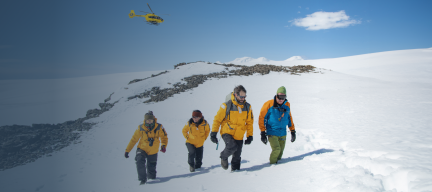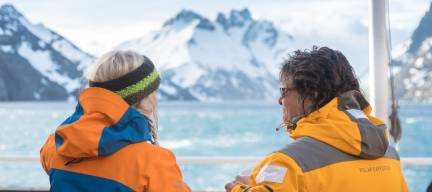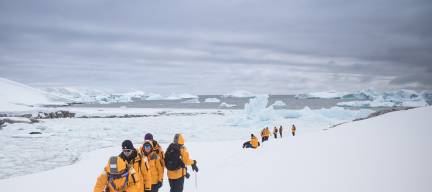What makes Antarctica such a fascinating place in the minds of passionate polar adventurers? Aside from the allure of the expansive glaciers and snow-laden mountains, many people are attracted to the southern Polar Region for wildlife, including penguins, whales, walruses, and seabirds.
Penguins are one of the most populous species in the Antarctic. Remember the rule if you’re deciding between the Arctic and Antarctic: for polar bears, head to the Arctic; for penguins, the Antarctic is your destination.
The march of emperor penguins at Snow Hill Island, Antarctica. Photo: Dave Merron
There are various regions in the Southern Ocean where travelers can witness penguins in large numbers in their natural habitat. So what are some of the best places to see penguins in the wild? Read on as we help you plan a penguin-filled adventure.
Top 5 best places to see penguins in the wild
As previously mentioned, numerous species of penguins are found in the Antarctic and sub-Antarctic regions. But that doesn’t mean you only have one location to select for a penguin adventure.
The Antarctic continent is the largest landmass within the Southern Ocean, and it, and the surrounding regions, are home to incredibly large penguin colonies often numbering in the thousands.
So what are some examples of the best places to see penguins in the wild? Here are our five best recommendations for you.
South Georgia Island
One of the northernmost islands in the Southern Ocean, South Georgia is one of the best places to photograph penguin colonies. The beaches of South Georgia Island are teeming with thousands of King penguins, which stand approximately three feet tall and resemble their close cousins the emperor penguins in physical appearance.
A large colony of king penguins at Gold Harbor, South Georgia Island. Photo: Dave Merron
King penguins, as well as other bird and wildlife species, are among the highlights of our popular South Georgia and Antarctic Peninsula: Penguin Safari adventure. This is a 16-day journey that will take you across the Southern Ocean as you navigate the waters near the Antarctic Peninsula. Along the way, you’ll spot icebergs inhabited by penguins, seals, and other animals that thrive in the region’s cold climate. South Georgia and the vast penguin colonies will be the highlights of Days 7 and 8 of your adventure.
Falkland Islands
Located even further north than South Georgia and off the coast of the tip of South America, the Falkland Islands is a beautiful archipelago of wildlife-rich islands. The Falklands Islands are a haven of wildlife, including many different species of penguins such as:
- King penguins
- Magellanic penguins
- Gentoo penguins
- Southern Rockhopper penguins

Magellanic penguins are curious about a Quark Expeditions guest at Carcass Island in the Falkland Islands. Photo: Nicky Souness
You’ll have the chance to observe these species of penguins during our Falklands, South Georgia, and Antarctica: Explorers and Kings voyage. This is a 20-day journey that spans much of the Southern Ocean. The Falklands are one of the earliest stops on the journey so make sure you have your camera gear ready.
Penguins aren’t the only bird species that you’ll spot on the Falklands. The islands are home to an incredible bird population that includes rarely seen species. You can read all about our bird watching guide on the Falklands for more information.
Antarctic Peninsula
Of course, penguins can also be observed on the Antarctic mainland itself. The peninsula, especially in the area around the Lemaire Channel, is known for large penguin colonies that populate the beaches where they lay their eggs and rear their young chicks.
To get to see these beautiful landscapes teeming with various penguin colonies, consider joining our Antarctic Explorer: Discovering the 7th Continent journey. This 11-day voyage will give you a chance to experience life at sea as you navigate toward the Antarctic mainland. Areas around the Lemaire Channel will entice you to disembark from your polar vessel and explore areas of the coast in their entirety.
If you’re lucky, your adventure guides will help you spot various penguin colonies that make their homes near the coast. You’re most likely to witness Chinstrap, Adélie, and Gentoo penguins on this journey; make sure you have your cameras ready to document each species in their natural habitats.
Snow Hill Island
If you expect a place that’s called Snow Hill to be a snowy and mountainous terrain, well, you’d be right. The name is very fitting for the location, which is situated in the ice-laden Weddell Sea.
The island is best known as a breeding ground for one of the largest colonies of Emperor penguins on the planet. Our esteemed penguin experts anticipate over 10,000 Emperor penguins to live and play near Snow Hill Island, making it unquestionably one of the best places to see penguins in the world.
A rookery of thousands of emperor penguins and their chicks at Snow Hill Island. Photo: Quark Expeditions
In 2023, Quark Expeditions will be leading expeditions to Snow Hill called Emperor Quest: Expedition to Snow Hill, which will be a 14-day adventure that includes a quest to visit the remote penguin colony. Our network of penguin scientists, ornithologists, biologists, and polar historians will be on hand for this adventure to help you learn more about the Emperor penguins and how they continue to make their homes on and around Snow Hill.
Diego Ramirez Islands
The Diego Ramirez Islands are technically separate from the Antarctic Peninsula. However, they form a distinct crossover between the sub-Antarctic regions of the Southern Ocean, separated by the Drake Passage, and the mixed climates of Patagonia on the southern borders of South America.
The Diego Ramirez Islands are a prime location on our Antarctic Explorer: Discovering the 7th Continent plus Cape Horn and Diego Ramirez adventure (say that three times fast:)). This is a 13-day journey that embarks from the tip of Patagonia, and Diego Ramirez is the first stop on that journey. Here, you’ll have the chance to see entire populations of Rockhopper, Macaroni, and Magellanic penguins; your adventure guide will help you distinguish between the different species so that you can photograph and document them correctly.









